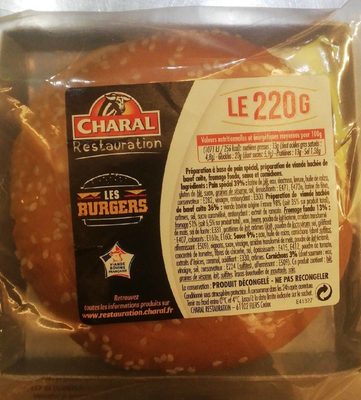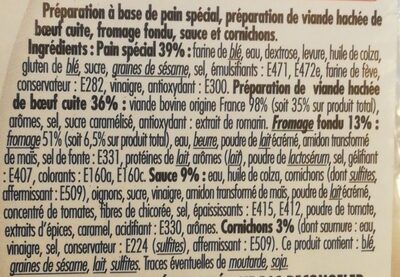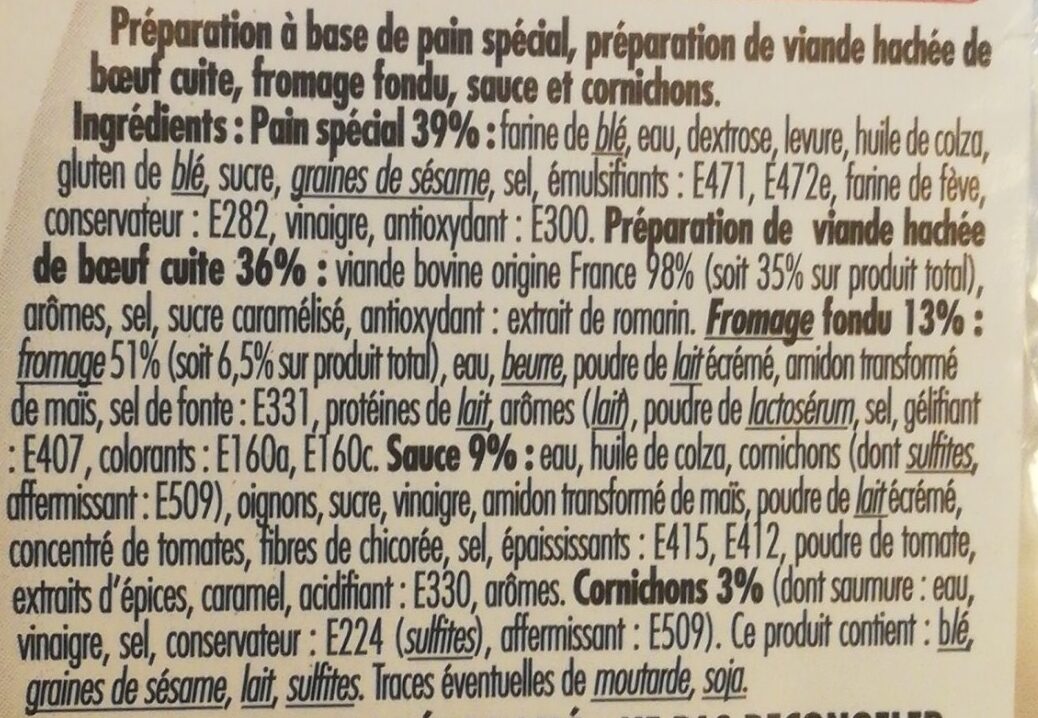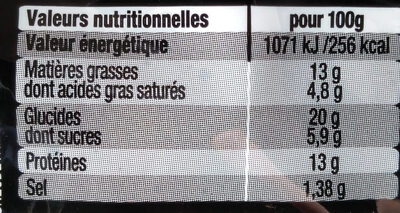Help us make food transparency the norm!
As a non-profit organization, we depend on your donations to continue informing consumers around the world about what they eat.
The food revolution starts with you!
Burger Le 220 G - Charal
Burger Le 220 G - Charal
This product page is not complete. You can help to complete it by editing it and adding more data from the photos we have, or by taking more photos using the app for Android or iPhone/iPad. Thank you!
×
Barcode: 3181238961152 (EAN / EAN-13)
Quantity: 220 g
Brands: Charal
Categories: Sandwiches, Hamburgers
Labels, certifications, awards:
French meat, French beef, Green Dot
Countries where sold: France
Matching with your preferences
Health
Ingredients
-
76 ingredients
: Pain spécial 39%: farine de blé, eau, dextrose, levure, huile de colza, gluten de blé, sucre, graines de sésame, sel, émulsifiants : E471, E472e, farine de fève, conservateur : E282, vinaigre, antioxydant : E300. Préparation de viande hachée de bœuf cuite 36% : viande bovine origine France 98% (soit 35% sur produit total), arômes, sel, sucre caramélisé, antioxydant : extrait de romarin. Fromage fondu 13%: fromage 51% (soit 6,5% sur produit total), eau, beurre, poudre de lait écrémé, amidon transformé de mais, sel de fonte: E331, protéines de lait, arômes (lait), poudre de lactosérum, sel, gélifiant :E407, colorants: E160a, E160c. Sauce 9% : eau, huile de colza, cornichons (dont sulfites, affermissant: E509), oignons, sucre, vinaigre, amidon transformé de maïs, poudre de lait écrémé, concentré de tomates, fibres de chicorée, sel, épaississants: E415, E412, poudre de tomate, extraits d'épices, caramel, acidifiant : E330, arômes. Cornichons 3% (dont saumure : eau, vinaigre, sel, conservateur : E224 (sulfites), affermissant : E509).Allergens: Gluten, Milk, Sesame seeds, Sulphur dioxide and sulphitesTraces: Mustard, Soybeans
Food processing
-
Ultra processed foods
Elements that indicate the product is in the 4 - Ultra processed food and drink products group:
- Additive: E14XX - Modified Starch
- Additive: E160a - Carotene
- Additive: E160c - Paprika extract
- Additive: E407 - Carrageenan
- Additive: E412 - Guar gum
- Additive: E415 - Xanthan gum
- Additive: E471 - Mono- and diglycerides of fatty acids
- Additive: E472e - Mono- and diacetyltartaric acid esters of mono- and diglycerides of fatty acids
- Ingredient: Colour
- Ingredient: Dextrose
- Ingredient: Emulsifier
- Ingredient: Firming agent
- Ingredient: Flavouring
- Ingredient: Gelling agent
- Ingredient: Glucose
- Ingredient: Gluten
- Ingredient: Milk proteins
- Ingredient: Thickener
- Ingredient: Whey
Food products are classified into 4 groups according to their degree of processing:
- Unprocessed or minimally processed foods
- Processed culinary ingredients
- Processed foods
- Ultra processed foods
The determination of the group is based on the category of the product and on the ingredients it contains.
Additives
-
E160a - Carotene
Carotene: The term carotene -also carotin, from the Latin carota, "carrot"- is used for many related unsaturated hydrocarbon substances having the formula C40Hx, which are synthesized by plants but in general cannot be made by animals -with the exception of some aphids and spider mites which acquired the synthesizing genes from fungi-. Carotenes are photosynthetic pigments important for photosynthesis. Carotenes contain no oxygen atoms. They absorb ultraviolet, violet, and blue light and scatter orange or red light, and -in low concentrations- yellow light. Carotenes are responsible for the orange colour of the carrot, for which this class of chemicals is named, and for the colours of many other fruits, vegetables and fungi -for example, sweet potatoes, chanterelle and orange cantaloupe melon-. Carotenes are also responsible for the orange -but not all of the yellow- colours in dry foliage. They also -in lower concentrations- impart the yellow coloration to milk-fat and butter. Omnivorous animal species which are relatively poor converters of coloured dietary carotenoids to colourless retinoids have yellowed-coloured body fat, as a result of the carotenoid retention from the vegetable portion of their diet. The typical yellow-coloured fat of humans and chickens is a result of fat storage of carotenes from their diets. Carotenes contribute to photosynthesis by transmitting the light energy they absorb to chlorophyll. They also protect plant tissues by helping to absorb the energy from singlet oxygen, an excited form of the oxygen molecule O2 which is formed during photosynthesis. β-Carotene is composed of two retinyl groups, and is broken down in the mucosa of the human small intestine by β-carotene 15‚15'-monooxygenase to retinal, a form of vitamin A. β-Carotene can be stored in the liver and body fat and converted to retinal as needed, thus making it a form of vitamin A for humans and some other mammals. The carotenes α-carotene and γ-carotene, due to their single retinyl group -β-ionone ring-, also have some vitamin A activity -though less than β-carotene-, as does the xanthophyll carotenoid β-cryptoxanthin. All other carotenoids, including lycopene, have no beta-ring and thus no vitamin A activity -although they may have antioxidant activity and thus biological activity in other ways-. Animal species differ greatly in their ability to convert retinyl -beta-ionone- containing carotenoids to retinals. Carnivores in general are poor converters of dietary ionone-containing carotenoids. Pure carnivores such as ferrets lack β-carotene 15‚15'-monooxygenase and cannot convert any carotenoids to retinals at all -resulting in carotenes not being a form of vitamin A for this species-; while cats can convert a trace of β-carotene to retinol, although the amount is totally insufficient for meeting their daily retinol needs.Source: Wikipedia
-
E224 - Potassium metabisulphite
Potassium metabisulfite: Potassium metabisulfite, K2S2O5, also known as potassium pyrosulfite, is a white crystalline powder with a pungent sulfur odour. The main use for the chemical is as an antioxidant or chemical sterilant. It is a disulfite and is chemically very similar to sodium metabisulfite, with which it is sometimes used interchangeably. Potassium metabisulfite is generally preferred out of the two as it does not contribute sodium to the diet. Potassium metabisulfite has a monoclinic crystal structure which decomposes at 190 °C, yielding potassium sulfite and sulfur dioxide: K2S2O5-s- → K2SO3-s- + SO2-g-Source: Wikipedia
-
E282 - Calcium propionate
Calcium propanoate: Calcium propanoate or calcium propionate has the formula Ca-C2H5COO-2. It is the calcium salt of propanoic acid.Source: Wikipedia
-
E330 - Citric acid
Citric acid is a natural organic acid found in citrus fruits such as lemons, oranges, and limes.
It is widely used in the food industry as a flavor enhancer, acidulant, and preservative due to its tart and refreshing taste.
Citric acid is safe for consumption when used in moderation and is considered a generally recognized as safe (GRAS) food additive by regulatory agencies worldwide.
-
E331 - Sodium citrates
Sodium citrate: Sodium citrate may refer to any of the sodium salts of citrate -though most commonly the third-: Monosodium citrate Disodium citrate Trisodium citrateThe three forms of the salt are collectively known by the E number E331. Sodium citrates are used as acidity regulators in food and drinks, and also as emulsifiers for oils. They enable cheeses to melt without becoming greasy.Source: Wikipedia
-
E407 - Carrageenan
Carrageenan (E407), derived from red seaweed, is widely employed in the food industry as a gelling, thickening, and stabilizing agent, notably in dairy and meat products.
It can exist in various forms, each imparting distinct textural properties to food.
However, its degraded form, often referred to as poligeenan, has raised health concerns due to its potential inflammatory effects and its classification as a possible human carcinogen (Group 2B) by the International Agency for Research on Cancer (IARC).
Nevertheless, food-grade carrageenan has been deemed safe by various regulatory bodies when consumed in amounts typically found in food.
-
E412 - Guar gum
Guar gum (E412) is a natural food additive derived from guar beans.
This white, odorless powder is valued for its remarkable thickening and stabilizing properties, making it a common ingredient in various food products, including sauces, dressings, and ice creams.
When used in moderation, guar gum is considered safe for consumption, with no known adverse health effects.
-
E415 - Xanthan gum
Xanthan gum (E415) is a natural polysaccharide derived from fermented sugars, often used in the food industry as a thickening and stabilizing agent.
This versatile food additive enhances texture and prevents ingredient separation in a wide range of products, including salad dressings, sauces, and gluten-free baked goods.
It is considered safe for consumption even at high intake amounts.
-
E471 - Mono- and diglycerides of fatty acids
Mono- and diglycerides of fatty acids (E471), are food additives commonly used as emulsifiers in various processed foods.
These compounds consist of glycerol molecules linked to one or two fatty acid chains, which help stabilize and blend water and oil-based ingredients. E471 enhances the texture and shelf life of products like margarine, baked goods, and ice cream, ensuring a smooth and consistent texture.
It is generally considered safe for consumption within established regulatory limits.
-
E509 - Calcium chloride
Calcium chloride: Calcium chloride is an inorganic compound, a salt with the chemical formula CaCl2. It is a colorless crystalline solid at room temperature, highly soluble in water. Calcium chloride is commonly encountered as a hydrated solid with generic formula CaCl2-H2O-x, where x = 0, 1, 2, 4, and 6. These compounds are mainly used for de-icing and dust control. Because the anhydrous salt is hygroscopic, it is used as a desiccant.Source: Wikipedia
Ingredients analysis
-
May contain palm oil
Ingredients that may contain palm oil: E471, E472e, E160a
-
Non-vegan
Non-vegan ingredients: fr:Préparation viande hachée de boeuf, Beef meat, Melted cheese, Cheese, Butter, Skimmed milk powder, Milk proteins, Whey powder, Skimmed milk powder
-
Non-vegetarian
Non-vegetarian ingredients: fr:Préparation viande hachée de boeuf, Beef meat
-
Details of the analysis of the ingredients
: Pain spécial 39% (farine de blé), eau, dextrose, levure, huile de colza, gluten de blé, sucre, graines de sésame, sel, émulsifiants (e471), e472e, farine de fève, conservateur (e282), vinaigre, antioxydant (e300, Préparation de viande hachée de bœuf 36%), viande bovine 98% (), arômes, sel, sucre caramélisé, antioxydant (extrait de romarin, Fromage fondu 13%), fromage 51% (), eau, beurre, poudre de lait écrémé, amidon transformé de mais, sel de fonte (e331), protéines de lait, arômes, poudre de lactosérum, sel, gélifiant (e407), colorants (e160a), e160c, Sauce 9% (eau), huile de colza, cornichons (dont sulfites, affermissant (e509)), oignons, sucre, vinaigre, amidon transformé de maïs, poudre de lait écrémé, concentré de tomates, fibres de chicorée, sel, épaississants (e415), e412, tomate, extraits d'épices, caramel, acidifiant (e330), arômes, Cornichons 3% (dont saumure (eau), vinaigre, sel, conservateur (e224), affermissant (e509))- Pain spécial -> en:special-bread - percent: 39
- farine de blé -> en:wheat-flour - vegan: yes - vegetarian: yes - ciqual_proxy_food_code: 9410
- eau -> en:water - vegan: yes - vegetarian: yes - ciqual_food_code: 18066
- dextrose -> en:dextrose - vegan: yes - vegetarian: yes - ciqual_proxy_food_code: 31016
- levure -> en:yeast - vegan: yes - vegetarian: yes
- huile de colza -> en:colza-oil - vegan: yes - vegetarian: yes - from_palm_oil: no - ciqual_food_code: 17130
- gluten de blé -> en:wheat-gluten - vegan: yes - vegetarian: yes
- sucre -> en:sugar - vegan: yes - vegetarian: yes - ciqual_proxy_food_code: 31016
- graines de sésame -> en:sesame-seeds - vegan: yes - vegetarian: yes - ciqual_food_code: 15010
- sel -> en:salt - vegan: yes - vegetarian: yes - ciqual_food_code: 11058
- émulsifiants -> en:emulsifier
- e471 -> en:e471 - vegan: maybe - vegetarian: maybe - from_palm_oil: maybe
- e472e -> en:e472e - vegan: maybe - vegetarian: maybe - from_palm_oil: maybe
- farine de fève -> en:broad-bean-flour - vegan: yes - vegetarian: yes - ciqual_proxy_food_code: 9410
- conservateur -> en:preservative
- e282 -> en:e282 - vegan: yes - vegetarian: yes
- vinaigre -> en:vinegar - vegan: yes - vegetarian: yes - ciqual_food_code: 11018
- antioxydant -> en:antioxidant
- e300 -> en:e300 - vegan: yes - vegetarian: yes
- Préparation de viande hachée de bœuf -> fr:preparation-viande-hachee-de-boeuf - vegan: no - vegetarian: no - ciqual_proxy_food_code: 6101 - percent: 36
- viande bovine -> en:beef-meat - vegan: no - vegetarian: no - ciqual_proxy_food_code: 6101 - percent: 98
- arômes -> en:flavouring - vegan: maybe - vegetarian: maybe
- sel -> en:salt - vegan: yes - vegetarian: yes - ciqual_food_code: 11058
- sucre caramélisé -> en:caramelised-sugar - vegan: yes - vegetarian: yes - ciqual_proxy_food_code: 31016
- antioxydant -> en:antioxidant
- extrait de romarin -> en:e392 - vegan: yes - vegetarian: yes
- Fromage fondu -> en:melted-cheese - vegan: no - vegetarian: maybe - ciqual_proxy_food_code: 12999 - percent: 13
- fromage -> en:cheese - vegan: no - vegetarian: maybe - ciqual_proxy_food_code: 12999 - percent: 51
- eau -> en:water - vegan: yes - vegetarian: yes - ciqual_food_code: 18066
- beurre -> en:butter - vegan: no - vegetarian: yes - ciqual_proxy_food_code: 16400
- poudre de lait écrémé -> en:skimmed-milk-powder - vegan: no - vegetarian: yes - ciqual_food_code: 19054
- amidon transformé de mais -> en:modified-corn-starch - vegan: yes - vegetarian: yes - ciqual_food_code: 9510
- sel de fonte -> en:emulsifying-salts
- e331 -> en:e331 - vegan: yes - vegetarian: yes
- protéines de lait -> en:milk-proteins - vegan: no - vegetarian: yes
- arômes -> en:flavouring - vegan: maybe - vegetarian: maybe
- poudre de lactosérum -> en:whey-powder - vegan: no - vegetarian: maybe
- sel -> en:salt - vegan: yes - vegetarian: yes - ciqual_food_code: 11058
- gélifiant -> en:gelling-agent
- e407 -> en:e407 - vegan: yes - vegetarian: yes
- colorants -> en:colour
- e160a -> en:e160a - vegan: maybe - vegetarian: maybe - from_palm_oil: maybe
- e160c -> en:e160c - vegan: yes - vegetarian: yes
- Sauce -> en:sauce - vegan: maybe - vegetarian: maybe - percent: 9
- eau -> en:water - vegan: yes - vegetarian: yes - ciqual_food_code: 18066
- huile de colza -> en:colza-oil - vegan: yes - vegetarian: yes - from_palm_oil: no - ciqual_food_code: 17130
- cornichons -> en:gherkin - vegan: yes - vegetarian: yes - ciqual_proxy_food_code: 11004
- dont sulfites -> en:sulfite
- affermissant -> en:firming-agent
- e509 -> en:e509 - vegan: yes - vegetarian: yes
- oignons -> en:onion - vegan: yes - vegetarian: yes - ciqual_food_code: 20034
- sucre -> en:sugar - vegan: yes - vegetarian: yes - ciqual_proxy_food_code: 31016
- vinaigre -> en:vinegar - vegan: yes - vegetarian: yes - ciqual_food_code: 11018
- amidon transformé de maïs -> en:modified-corn-starch - vegan: yes - vegetarian: yes - ciqual_food_code: 9510
- poudre de lait écrémé -> en:skimmed-milk-powder - vegan: no - vegetarian: yes - ciqual_food_code: 19054
- concentré de tomates -> en:tomato-concentrate - vegan: yes - vegetarian: yes - ciqual_food_code: 20068
- fibres de chicorée -> en:chicory-fibre - vegan: yes - vegetarian: yes - ciqual_food_code: 20026
- sel -> en:salt - vegan: yes - vegetarian: yes - ciqual_food_code: 11058
- épaississants -> en:thickener
- e415 -> en:e415 - vegan: yes - vegetarian: yes
- e412 -> en:e412 - vegan: yes - vegetarian: yes
- tomate -> en:tomato - vegan: yes - vegetarian: yes - ciqual_food_code: 20047
- extraits d'épices -> en:spice-extract - vegan: yes - vegetarian: yes
- caramel -> en:e150 - vegan: yes - vegetarian: yes
- acidifiant -> en:acid
- e330 -> en:e330 - vegan: yes - vegetarian: yes
- arômes -> en:flavouring - vegan: maybe - vegetarian: maybe
- Cornichons -> en:gherkin - vegan: yes - vegetarian: yes - ciqual_proxy_food_code: 11004 - percent: 3
- dont saumure -> en:brine
- eau -> en:water - vegan: yes - vegetarian: yes - ciqual_food_code: 18066
- vinaigre -> en:vinegar - vegan: yes - vegetarian: yes - ciqual_food_code: 11018
- sel -> en:salt - vegan: yes - vegetarian: yes - ciqual_food_code: 11058
- conservateur -> en:preservative
- e224 -> en:e224 - vegan: yes - vegetarian: yes
- affermissant -> en:firming-agent
- e509 -> en:e509 - vegan: yes - vegetarian: yes
- dont saumure -> en:brine
en:meat -> en:meat
en:beef -> en:beef
- Pain spécial -> en:special-bread - percent: 39
Nutrition
-
Poor nutritional quality
⚠ ️Warning: the amount of fiber is not specified, their possible positive contribution to the grade could not be taken into account.⚠ ️Warning: the amount of fruits, vegetables and nuts is not specified on the label, it was estimated from the list of ingredients: 6This product is not considered a beverage for the calculation of the Nutri-Score.
Positive points: 0
- Proteins: 5 / 5 (value: 13, rounded value: 13)
- Fiber: 0 / 5 (value: 0, rounded value: 0)
- Fruits, vegetables, nuts, and colza/walnut/olive oils: 0 / 5 (value: 6.8125, rounded value: 6.8)
Negative points: 14
- Energy: 3 / 10 (value: 1071, rounded value: 1071)
- Sugars: 1 / 10 (value: 5.9000000953674, rounded value: 5.9)
- Saturated fat: 4 / 10 (value: 4.8000001907349, rounded value: 4.8)
- Sodium: 6 / 10 (value: 559.99999046324, rounded value: 560)
The points for proteins are not counted because the negative points are greater or equal to 11.
Nutritional score: (14 - 0)
Nutri-Score:
-
Nutrient levels
-
Fat in moderate quantity (13%)
What you need to know- A high consumption of fat, especially saturated fats, can raise cholesterol, which increases the risk of heart diseases.
Recommendation: Limit the consumption of fat and saturated fat- Choose products with lower fat and saturated fat content.
-
Saturated fat in moderate quantity (4.8%)
What you need to know- A high consumption of fat, especially saturated fats, can raise cholesterol, which increases the risk of heart diseases.
Recommendation: Limit the consumption of fat and saturated fat- Choose products with lower fat and saturated fat content.
-
Sugars in moderate quantity (5.9%)
What you need to know- A high consumption of sugar can cause weight gain and tooth decay. It also augments the risk of type 2 diabetes and cardio-vascular diseases.
Recommendation: Limit the consumption of sugar and sugary drinks- Sugary drinks (such as sodas, fruit beverages, and fruit juices and nectars) should be limited as much as possible (no more than 1 glass a day).
- Choose products with lower sugar content and reduce the consumption of products with added sugars.
-
Salt in moderate quantity (1.4%)
What you need to know- A high consumption of salt (or sodium) can cause raised blood pressure, which can increase the risk of heart disease and stroke.
- Many people who have high blood pressure do not know it, as there are often no symptoms.
- Most people consume too much salt (on average 9 to 12 grams per day), around twice the recommended maximum level of intake.
Recommendation: Limit the consumption of salt and salted food- Reduce the quantity of salt used when cooking, and don't salt again at the table.
- Limit the consumption of salty snacks and choose products with lower salt content.
-
-
Nutrition facts
Nutrition facts As sold
for 100 g / 100 mlAs sold
per serving (220g)Compared to: Hamburgers Energy 1,071 kj
(256 kcal)2,360 kj
(563 kcal)+15% Fat 13 g 28.6 g +11% Saturated fat 4.8 g 10.6 g +25% Carbohydrates 20 g 44 g +47% Sugars 5.9 g 13 g +163% Fiber ? ? Proteins 13 g 28.6 g -6% Salt 1.4 g 3.08 g +4% Fruits‚ vegetables‚ nuts and rapeseed‚ walnut and olive oils (estimate from ingredients list analysis) 6.812 % 6.812 %
Environment
-
Eco-Score not computed - Unknown environmental impact
We could not compute the Eco-Score of this product as it is missing some data, could you help complete it?Could you add a precise product category so that we can compute the Eco-Score? Add a category
Packaging
-
Missing packaging information for this product
⚠ ️ The information about the packaging of this product is not filled in.Take a photo of the recycling information Take a photo of the recycling information
Transportation
-
Origins of ingredients
Origins of ingredients with a high impact
Origin of the product and/or its ingredients % of ingredients Impact Unknown 100 %High France 0 %Medium
Report a problem
-
Incomplete or incorrect information?
Category, labels, ingredients, allergens, nutritional information, photos etc.
If the information does not match the information on the packaging, please complete or correct it. Open Food Facts is a collaborative database, and every contribution is useful for all.
Data sources
Product added on by kiliweb
Last edit of product page on by quentinbrd.
Product page also edited by alphonsemagova, openfoodfacts-contributors, roboto-app, segundo, yuka.VnFFdUViOHhyUFVFaHM5a3J5aUoxZFJ3KzdQMURYN3JHOFFvSVE9PQ, yuka.sY2b0xO6T85zoF3NwEKvlkZgcvWFvBvZbjHUvEm6wMqwCbrDXMxJ05OrPqs.









